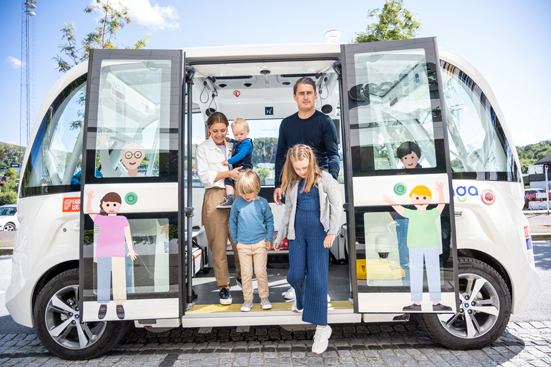Fabulos tests autonomous buses in Norway
- September 2, 2020
- Steve Rogerson

The rural commune of Gjesdal in south-west Norway is testing an autonomous bus service. The pilot project will run until mid-September and is part of the EU-funded Fabulos pre-commercial procurement project.
The two autonomous vehicles (AVs) with one electric Tesla form part of an on-demand, door-to-door transit scheme to help Gjesdal residents get around town for errands and socialising, according to Linn Terese Lohne Marken, project lead and CEO of Mobility Forus, a provider of self-driving vehicles and services.
Mobility Forus is one of the players in the Saga consortium, a research group founded for participating in the Fabulos initiative. It looks at how AVs operate in rural areas faced with steep hills, heavy traffic and pedestrians.
For the Gjesdal project, the buses have been integrated in the local public transportation network, so passengers receive information about the service via national and local travel planner apps such as Google Maps, Kolumbus and Entur. The route of the AVs connects the popular residential area near Lake Fjermestadvatnet to Gjesdal’s city centre.
Saga also offers a door-to-door transportation service on-demand that can be ordered via the HentMeg-web site, a service offered by the local public transport company Kolumbus. The on-demand system is managed by Spare, a Canada-based transit software provider.
“We think the future of safe, efficient and scalable transit is autonomous,” said Spare co-founder and CEO Kristoffer Vik Hansen. “This pilot project is an important step towards that future. We hope the residents of Gjesdal are as excited to try the AVs as we are to help power them. We can’t wait to see what impact it will have on transit operations.”
The AVs, nicknamed Gudrun and Gerard, are all-electric minibuses produced by French robotics company Navya. The bus is autonomous according to SAE level three, meaning it can take over driving functions under certain circumstances. For the pilot, buses have a maximum permitted speed of 18km per hour. The AVs also have trained operators on board as per safety regulations, who can take over when Gudrun and Gerard need a helping hand.
“We hope this innovative technology will encourage people to leave the car at home and opt to get around using transit instead,” said Frode Fjeldsbø, mayor of Gjesdal Municipality. “If successful, we would be open to making AVs a permanent part of our transport system.”
He has received feedback from young travellers that the shuttle’s exterior is welcoming.
The Gjesdal project runs until September 11th and is available Monday to Friday, 9am to 3pm. Once complete, the AVs will move to Helmond in the Netherlands for a second pilot based on the same service and technology parameters.
Formed in 2018, Saga is a research consortium consisting of Mobility Forus, Spare Labs, Rambøll Management Consulting and Halogen.
Mobility Forus – formerly Forus PRT – has been operating self-driving vehicles since 2017, and was the first in Norway to pilot self-driving buses on public roads. Mobility Forus is owned by Boreal and Seabrokers Group.
Spare provides automated on-demand transportation software to cities around the world. With its technology, it says it is accelerating the shift to self-driving and efficient mobility. Spare powers the on-demand microtransit system for the Kolumbus transit authority.
Rambøll is an engineering, architecture and consultancy company founded in Denmark in 1945. Its experience ranges from modelling the impact of urban development on transport use to estimating the socio-economic effects of different methods and providing roadmaps for new technologies such as autonomous vehicles.
Halogen is a design consultancy specialising in solving problems in complex environments. Halogen designs products, processes, services and systems with the user’s needs at the centre. In this project, Halogen has contributed with service design, user experience, process management, communications and visuals.
Fabulos (Future Automated Bus Urban Level Operation System) is a pre-commercial procurement competitive research and development project that seeks to establish and deliver a systemic proof-of-concept for autonomous first and last-kilometre public transport as part of an urban area’s existing transit infrastructure. It has received funding from the European Union’s Horizon 2020 research and innovation programme and will run from January 2018 until December 2020. The project has partners in Estonia, Finland, Greece, Netherlands, Norway and Portugal.





